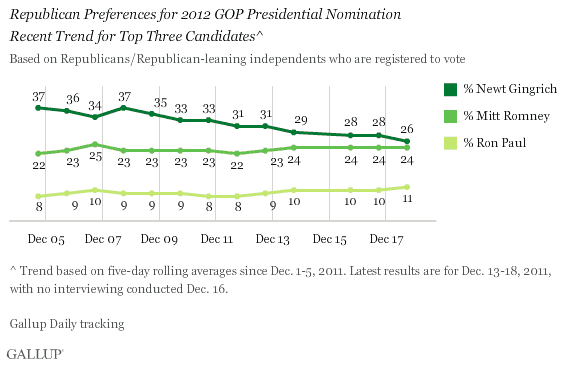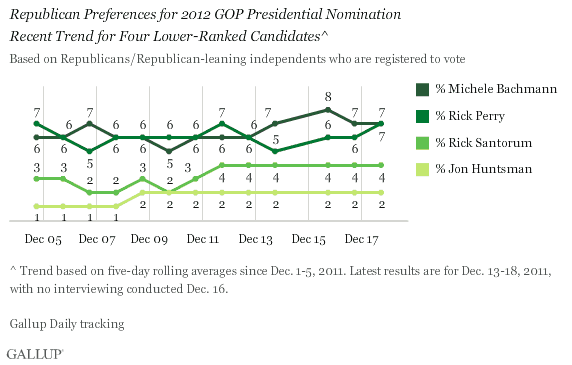PRINCETON, NJ -- After enjoying 14- to 15-percentage-point leads over Mitt Romney in early December, Newt Gingrich is now statistically tied with Romney in national Republican preferences for the 2012 GOP presidential nomination: 26% for Gingrich vs. 24% for Romney. This follows a steady decline in support for Gingrich in the past 10 days.

The latest findings are from Dec. 13-18 Gallup Daily tracking, based on 1,177 Republicans and Republican-leaning independents who are registered to vote. Gallup initiated Daily tracking of the Republican presidential trial heat on Dec. 1, and reports the results in continuous five-day rolling averages.
No single candidate has benefited proportionately more from Gingrich's 11-point decline -- from 37% to 26% -- over the past 10 days. Rather, Gallup polling finds slight increases in support for the six remaining major candidates in the race. Also, the percentage of Republicans favoring none of the candidates or who are unsure has risen by three points, from 14% to 17%.
Twenty-four percent of registered Republicans and Republican-leaning independents now favor Romney for the nomination. This is up just slightly from the 22% to 23% level seen for much of the first two weeks of December. Support for Ron Paul is now 11%, up from 8% to 9% earlier in the month -- marking the first time his support has been above 10% since mid-September. At that time, a Gallup poll of all Republicans/Republican-leaning independents put his support at 13%.
Current support for Michele Bachmann and Rick Perry, at 7% each, Rick Santorum, at 4%, and Jon Huntsman, at 2%, is either one or two percentage points higher than what it was when Gingrich last peaked at 37%.

Bottom Line
Recent surveys of potential Iowa Republican caucus-goers show Gingrich falling behind Romney and Paul, after Gingrich led the field from mid-November through early December. This has been widely attributed to the barrage of negative ads that Gingrich's Republican opponents have run against him in Iowa. However, even though Republicans nationwide have likely not seen or heard these ads, they have toned down their support for the former speaker, once again moving Romney close to front-runner status -- something he hasn't had an undisputed claim on since July. Unfortunately for Romney, the sizable percentage of the vote put in play by Gingrich's recent decline has not all gone his way, but instead has been scattered among the entire field. This fits the pattern seen over and over again in 2011, in which Romney fails to benefit each time various Republican candidates have fizzled out after surging. That this pattern continues today adds to the body of evidence that a segment of Republican voters want to nominate someone other than Romney.
Survey Methods
Results are based on telephone interviews conducted as part of Gallup Daily tracking Dec. 13-18, 2011 (no interviewing was conducted on Dec. 16), with a random sample of 1,177 Republicans and independents who lean Republican who are registered to vote, aged 18 and older, living in all 50 U.S. states and the District of Columbia.
For results based on the total sample of registered voters who are Republicans or Republican-leaning independents, one can say with 95% confidence that the maximum margin of sampling error is ±3 percentage points.
Interviews are conducted with respondents on landline telephones and cellular phones, with interviews conducted in Spanish for respondents who are primarily Spanish-speaking. Each sample includes a minimum quota of 400 cell phone respondents and 600 landline respondents per 1,000 national adults, with additional minimum quotas among landline respondents by region. Landline telephone numbers are chosen at random among listed telephone numbers. Cell phone numbers are selected using random-digit-dial methods. Landline respondents are chosen at random within each household on the basis of which member had the most recent birthday.
Samples are weighted by gender, age, race, Hispanic ethnicity, education, region, adults in the household, and phone status (cell phone only/landline only/both, cell phone mostly, and having an unlisted landline number). Demographic weighting targets are based on the March 2010 Current Population Survey figures for the aged 18 and older non-institutionalized population living in U.S. telephone households. All reported margins of sampling error include the computed design effects for weighting and sample design.
In addition to sampling error, question wording and practical difficulties in conducting surveys can introduce error or bias into the findings of public opinion polls.
For more details on Gallup's polling methodology, visit www.gallup.com.
